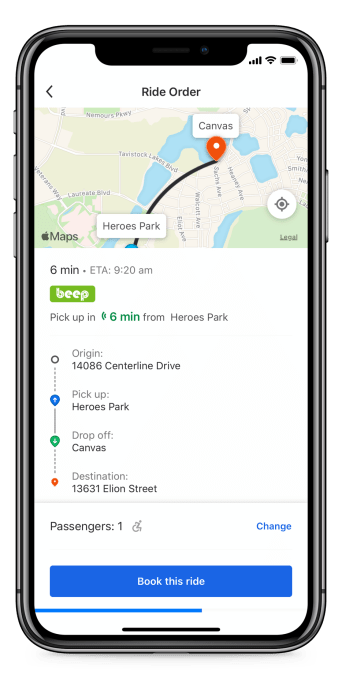Israeli trip-planning app Moovit is integrating with Orlando-based autonomous shuttle startup Beep, which will allow riders to view options for taking Beep shuttles alongside other forms of transit, like buses or trains. The partnership also brings Moovit’s routing and fleet management software to Beep’s backend, technology that calculates dynamic routes, vehicle location and dispatch services, according to Moovit.
While Moovit has integrated with various forms of new mobility lately, including a handful of micromobility companies, this is the first time the startup has integrated with an autonomous shuttle, as well as the first time Moovit users in the U.S. are able to hail an autonomous vehicle via the app, according to Sharon Kaslassi, Moovit’s global PR manager.
“Autonomous vehicles are going to be increasingly prevalent in the mobility sphere,” Kaslassi told TechCrunch. “Managing AV deployments and incorporating these services into Moovit’s [mobility-as-a-service (MaaS)] platform fits with this broader strategy and brings Moovit even more close to its vision of MaaS.”
The Moovit app will be available to Beep riders only in Lake Nona, Florida, a 17-square-mile master-planned community in Orlando where Beep has been running an autonomous shuttle service since 2019. The company says it has carried more than 50,000 passengers in that area over the past three years, connecting residential, commercial, retail, recreational and medical services.

Moovit users in Lake Nona, Florida will be able to see real-time info about their Beep autonomous shuttle. Image Credits: Moovit
Riders can currently book seats on a Beep shuttle via the Moovit app, which is unique for Moovit, as it usually directs users to other apps for bookings and payments. And while Beep’s service in Lake Nona is currently free, Moovit does have mobile payment capabilities, so when it becomes a paid service, riders will be able to pay via the Moovit app, as well, said Kaslassi. Moovit users are also able to track the Beep shuttle in real time and view estimated arrival and drop-off times.
“Lake Nona is a great example of a smart and connected community that is achieving innovative mobility initiatives with the right partners,” said Uli Gal-Oz, Moovit VP of business development. “The combination of Moovit’s consumer interface and on-demand solution, coupled with Beep’s AV fleet, is a powerful one. It has the potential to expand ever more into Lake Nona and other cities in the U.S. to solve first- and last-mile challenges.”
The two companies plan to expand their integration to additional project areas across the country, such as Tradition, a master-planned community in Port Lucie, Florida, according to a statement. Beep currently operates in about nine cities across the U.S., but plans on expanding its presence further.
In March, the company raised $25 million to level up its autonomous software, a round that saw participation from Intel, which owns Moovit. The month prior, Beep also said it would team up with another Intel company, AV tech company Mobileye, as well as German manufacturer Benteler, to build and deploy “autonomous movers,” or self-driving shuttles, across the U.S. in 2024.















 English (US) ·
English (US) ·